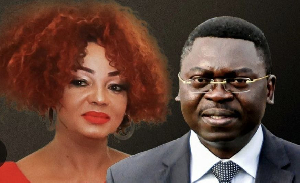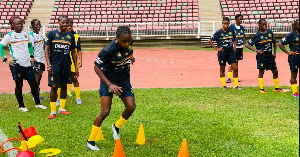The death toll from Ebola in west Africa has this week passed 8,000. More than 20,000 people have been infected in the three worst-affected countries - almost half of them in Sierra Leone.
One factor crucial to ending the outbreak is the safe burial of Ebola victims, because their bodies are particularly toxic.
The UK is funding more than 100 burial teams in Sierra Leone. Tulip Mazumdar spent the day with one of them, the Sierra Leone Red Cross Burial Team 9 in the capital Freetown. Here she describes her day.
We arrived at the Sierra Leone Red Cross headquarters to see men clambering on to the roofs of large vehicles. They were strapping plastic containers of disinfectant on to the trucks and ensuring they had all their protective gear they needed for the day ahead.
Each burial team had around 10 people, including family liaison officers, disinfectant sprayers and drivers.
We joined one of the teams dealing with the poorer eastern areas of the capital.
These were not highly trained medics or undertakers used to seeing dead bodies. They were people from the community, for example students and other volunteers. Depending on their job they are being paid approximately $10 (£6.60) a day.
This is considered a very good wage in a country where most people survive on much less.
But the jobs with the burial team can be extremely dangerous and many of those doing the work are ostracised from their communities and families for taking on the task.
Mustapha Gamanga was the Red Cross team leader for the day. Until the outbreak, he was a teacher.
But schools have been closed for months now, so his new job is safely collecting and burying bodies of the Ebola dead and ensuring communities understand what his teams are doing.
He said: "Initially my family were very worried, but I told them we are all well protected and this is a thing we have to do for our country.
"If we don't do it, then who will?"
The team got its first call from an area called Wellington, where Freetown recorded its first case of Ebola in July.
A ministry of health swabbing team rode ahead on motorbikes to take fluid samples from the victim before the burial team approached. This was important because subsequent tests of the samples can confirm whether the patient actually died of Ebola.
This collection of samples has only recently started to be routine practice. But it still takes three days to get the results.
If anyone dies at home in Sierra Leone, officials have to assume it is Ebola. Burial teams come in to remove and bury the bodies safely, even if it subsequently turns out they died of something else.
Mohammad Banguia, a medical student and one of the ministry of health team who took the samples, said: "It's very important because if there is no specimen there will be no result, so no proof that this person died of Ebola.
"If people don't know for sure who died of the virus, then it will continue to spread easily."
Alpha Kamara died aged 53 in a small house in the early hours of the morning.
The burial team put on their plastic overalls, gloves, goggles and face shields and entered his house.
Mr Kamara's wife and sister looked on, wailing in desperation and despair. Within 10 minutes, the team emerged carrying the body on a stretcher in a white plastic body bag.
It was laid on the floor while the community gathered and the local pastor said a short prayer.
Mohammad Kamara, one of the volunteers who collected the body, said: "The room was so small so we really struggled to remove the body.
"It was very dark in there and we didn't have any light but we managed to cope because we are well trained.
"It's very difficult work, but we just have to do it."
The next call came in from the central control room asking the team to head to the nearby Grassfield area.
As we walked to the house, we were told by a neighbour that the victim was a three-week-old baby boy. His name was Alpha.
Alpha's young mother slouched against the wall and wept. His father just stared on.
Team leader Mustapha Gamanga told me that it was highly unlikely Alpha died of Ebola because his parents were both well, but he said authorities couldn't take any chances.
Again the community gathered around and the local imam said a short prayer.
A key part of burial teams' jobs is to ensure that communities are as involved as is safely possible before and during a burial.
Aid workers have learned lessons from the early days of this outbreak, when some teams went into traditional communities in unfamiliar biohazard suits and removed bodies from homes.
In some places, teams were chased out of villages, or even attacked.
Volunteer Mohammad Kamara, who worked as an engineer before the outbreak, said: "Now, if they provide a coffin, we will make sure they are buried in the coffin.
"If they provide special clothes they want us to dress them in, we will do that too.
"That makes families feel like their loved one is being respected, and that we did something safe and dignified."
This was relentless work. Each time we drove into a different area, we instantly got a sense of the local community's fear and dread. The people knew what having a Red Cross convoy driving into their area could mean.
We arrived in the next village just a few miles around the corner.
Bassi Kargbo had lived here. He had been showing classic symptoms of Ebola, so he had gone to a holding centre to be checked.
His neighbours said it was unclear why he returned home later that day, but he died in the middle of the night.
As his body was brought out into the community, the piercing sound of grief filled the air.
If tests come back positive for Mr Kargbo, or any of the other bodies picked up today, so-called "contact tracers" will come into the communities and actively look for more cases.
They will also monitor people who had close contact with the victims before they died.
We drove up a steep hill for the latest alert from the control room. The track was extremely steep and our vehicle struggled to make it up.
Hilltop village has had a number of cases here in recent weeks. A few members of the burial team have already been here several times and know some of the residents.
One house sits at the very top of the hill. It belonged to 40-year-old Henry Sesay. He complained at the weekend of feeling unwell.
By Monday he could not eat or drink. He was found dead at his home last night.
The community gathered and there was another prayer led by the local imam.
The men in the community stood in front of the body and quietly chanted.
Despite all the efforts by teams to make the experience for families as bearable as possible, it is of course still incredibly painful for families.
But this is life in the time of Ebola and - a year since the initial outbreak - there is more acceptance of this new way of living.
Looking on, a few metres away from the body was Henry's sister, Margaret Kamara.
She said: "The way the authorities take these bodies is not pleasing. Before now we used to wash our dead bodies and bury them in the Muslim way.
"We know why they are doing this, they say there is an outbreak so we don't have a choice.
"All we want is an end to Ebola. That is all we are praying for."
Team 9 made its final journey of the day to Kingtom cemetery just outside Freetown city centre.
Only one family made it to the graveyard to pay their final respects. Baby Alpha's father stood over his son's tiny grave. He bowed his head and whispered a prayer.
Volunteer Mohammad Kamara said: "It's very difficult work but we are trained to do this.
"We are doing it for our country"
He has been doing this job for six months now and had buried hundreds of bodies
"Before I go to bed I pray. Sometimes I think about the things [I have seen] but I get over them. It's not easy, but we just need to continue."
Opinions of Thursday, 8 January 2015
Auteur: Tulip Mazumdar, BBC















